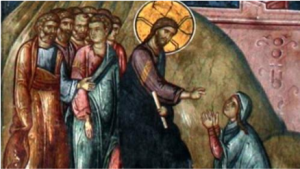
A Woman of the Gentiles
The second healing of a woman, written up in Mark, (Mark 7:24 then Mat 15:21) concerns a woman of Gentile race. Jesus has gone, presumably for R&R, into a Gentile region hoping not to be noticed but this woman discovers He is there and begs for healing for her daughter. Her daughter has ‘an unclean spirit’. This is where we encounter one of the vast differences of understanding between then and now. Having an unclean spirit sounds like devil possession to us but it is thought that in the ancient world any dysfunction, disease or disability could be seen as some kind of personal force that was against the will of God, the will of God being perfection of mind and body. Being unclean therefore meant that which was contrary to the law of God.
When she begs for His help he says, “Let the children be fed first, for it is not fair to take the children’s food and throw it to the dogs.”
Her reply, which gets her request granted, is to point out that even the dogs get to eat the crumbs that fall from the table. The discussion between Jesus and the woman sounds enormously harsh to our ears. When Jesus is usually thought of as kind and compassionate to those in need one wonders why such a story was included in all its rawness. At the time this gospel account was written the big question of whether or not Gentiles were acceptable in the Kingdom was raging. At this present time of theological reflection and biblical criticism the question is more significantly whether or not Jesus believed His mission was to all people or only ‘to the house of Israel’. These are big theological issues but what of our supposed ‘newbie’ reading the story? What would s/he make of it?
Let’s take the basic story. Jesus has gone away for a break; there is no mention of His disciples being with Him so He seems to have wanted real time out. He has been heavily engaged in the healing ministry of various sorts. He is tired. One thing that gets forgotten both on the scale of the divine Man and on lesser mortals is that healing ‘takes it out of you’. We will see in other stories how it is apparent that in healing He gives of Himself. So, He is having a break and this importuning woman comes in. She is a Gentile coming into a Jewish house, which is a bit off for a start, and He answers her out of His tiredness. It’s like He’s saying, “Don’t I have enough to do meeting the needs of all these Jews without having to attend to you Gentiles as well?” But she comes back with a very smart answer which delights Him and He sends out His healing love and energy to her daughter, who recovers on the instant. This is, I think, the first healing from a distance recorded in the Gospel.
A second thing we can take from this story is that as a human person Jesus could get tired and needed to take time out, just like the rest of us. If it is OK for the Son of God to need a break, why should we feel the need the ‘soldier on’ no matter what? And furthermore, I long to say, if it isn’t too shocking, that even the Son of God can sound a bit off when He is tired! I know this all sounds as though I am reducing the splendour of the Gospel to a very ordinary level of understanding but I long to find a way through the centuries of teaching which do not seem to impact in any positive way on the majority of people who are strangers to the ways of the Church. Maybe the accent having always been on His divine nature at the expense of His human, mine is a way of trying to redress the balance, demonstrating the glory of humanity made whole.
There are other things we can note from our twenty-first century perspective. One is the idea that any form of disharmony in a person, whether of mind or body, is contrary to how God wants us to be. I recently read a man, one involved in healing, writing about his belief that it was appropriate for all people to desire perfect health because that was what God intended for us. This is completely in line with the Gospel view point but somehow has got mislaid in the teaching. We are more inclined to be told that our suffering is God’s way of teaching, purifying or in some way giving us the opportunity to love and trust Him in spite of everything (‘which He sends’ is the often-unwritten coda). This contrary is so embedded it may be difficult to believe in God wanting perfect health in mind and body.
May I just conclude this section with reference to the non-local healing in which we see, once again, how where we are today, scientifically, is matched, unscientifically in the Gospel? Some, indeed a great deal, of research over recent years has shown that remote healing and the power of prayer are valid and scientifically proven to be so. In years gone by people believed that they could pray to God in a process rather like this: imagine a vertical diagonal line going up into heaven where God would process the request and decide, Yes, No or Wait. The divine decision would then take effect, imagine the diagonal line now coming down from heaven onto the person prayed for, wherever they may be. Now we are more likely to see the prayer line as straight, horizontal between the two, God being in all things, and all things being One, the divine Love surrounds and infuses all and our loving energy penetrates and heals by the power of that Love.
